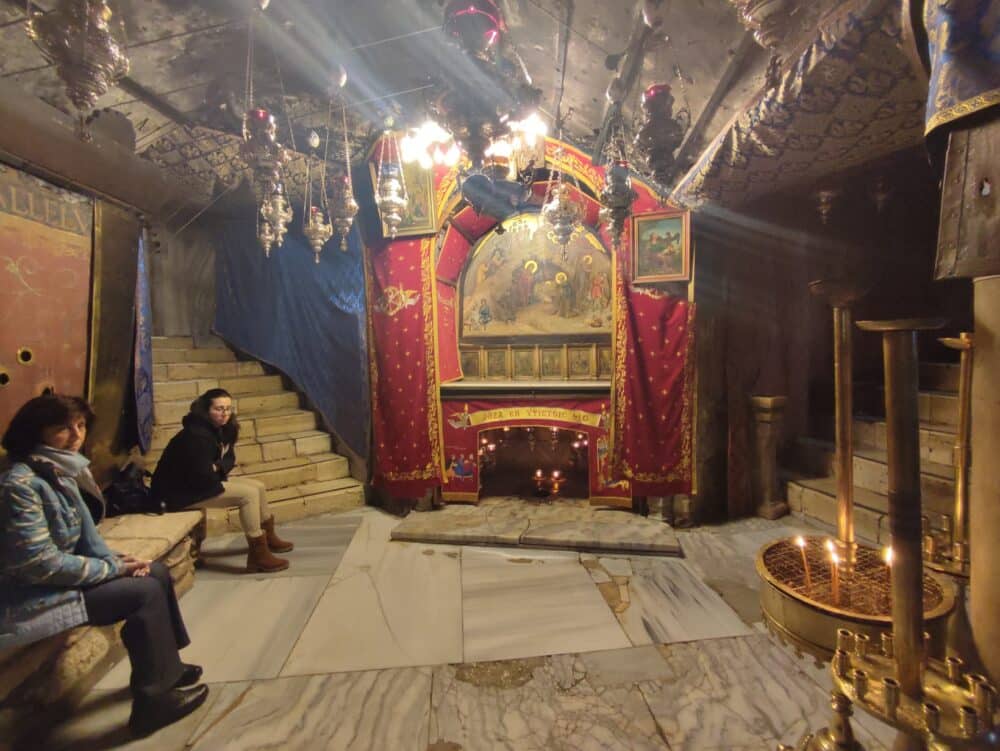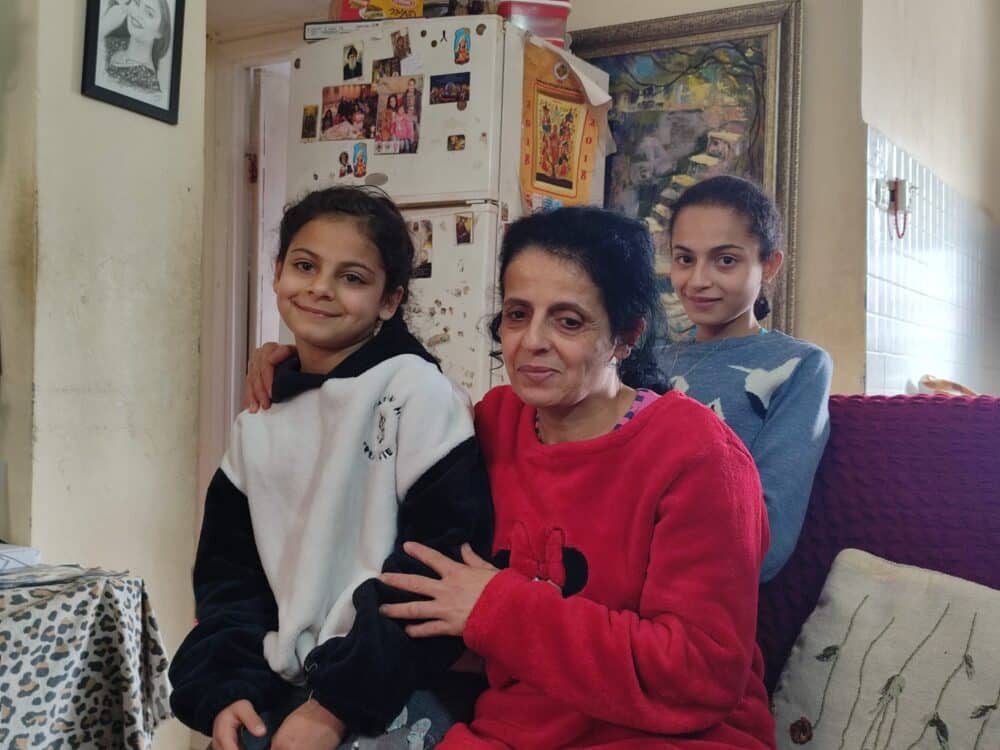"We have always worked to support our family and – believe me – to be forced to ask for help today is painful. We find it hard to live." Linda's husband worked in tourism. Today he's at home, and out of shame he doesn't even want to be seen talking to his wife. Linda and Michel live with their two children in Bethlehem, in a neighborhood where military raids are frequent, especially at night. "Covid had been a hard blow for us, but today the situation is much more tragic: we don't see a way out." George, his sixteen-year-old son who studies in a Catholic school, already has very clear ideas: "If the situation does not change, I will leave the country." As she listens to his words full of anger and sadness, Linda is moved and wipes away her tears with a colorful keffiyeh. "So many young people like my son no longer have hope. And it will be difficult to start again when this war is over." George gets up and looks out the window at the Church of the Nativity. He was baptized there. "We Christians feel the duty to protect the place where Jesus was born, and it is a privilege to live next to it." His voice is broken with emotion. "Even if I have to leave, I really hope to come back."

Bethlehem has been living in desperate conditions for months. There are about 25,000 inhabitants involved in tourism: almost none of them work today. But that's not the only problem: even those who used to travel to work in Israel, about 17,000 people, are now at home because the checkpoints have been closed since October 7. And that's not all, because Israel today refuses to return tax money to the Palestinian Authority, as stipulated in the Oslo Accords. The city of Jesus is the ghost of itself: unrecognizable in its empty square, while the honking of the taxi drivers searches in vain for new customers. The shutters of the souvernirs shops are down, on the street you don't even see the children in uniform coming back from school. The education system is also facing an unprecedented crisis. Cristine, a widow, knows this well, and has placed all her hopes in her daughters. "Schools open every other day and the government doesn't have the money to pay teachers." Lina and Danielle attend state school, but they haven't been going regularly since October. "The fees of private institutes are too high: I would not be able to send them without help." So the daughters have been attending in fits and starts, for six months. Cristine lost her husband to Covid a few years ago, and now she is alone to support the family. She started sewing and doing some odd jobs, but without much success. "There are no customers, the economy has come to a sudden halt. I don't want to live on charity, but I have no alternative: on October 7 we all died." On the phone, he tries to call his brother Anton, who is from Gaza. It doesn't ring. "It can happen, the current comes and goes, but every time it doesn't respond I'm afraid something has happened. He wanted to stay there, but we managed to escape. When we manage to talk to each other, he tells me about the nightmare they're going through."

Gaza lives in unimaginable conditions. The stories we hear in Palestine have the flavor of a situation with no way out. "A lot of diseases are spreading because they can't eat clean food and everything is dirty. Children have lice because of the dirt, and many skin diseases are spreading." Elham, of whom we have already reported , is well acquainted with the conditions of the Strip. "By comparison, in 2002, when there was the siege of the Nativity in Bethlehem, there were people who took it upon themselves to house displaced people in their homes. They provided everything, provided clothes, food, personal hygiene products. Try to imagine what the situation in Gaza is like now in these conditions: they don't even have the bare minimum to live." Elham spends his days on the phone, trying to figure out what possibilities there are to send aid. "I shipped about 700 dresses to Jordan and they managed to get into Gaza, but it was very difficult and it cost a lot more than it would have cost to ship them from here to Gaza directly." There is still food, but prices have tripled.
In Jerusalem the situation is different: missiles no longer fall and there is an air of precarious serenity. The Old City is deserted, pilgrims no longer crowd the souks between the Holy Sepulchre and the Esplanade of the Mosques, life resumes. Many, however, are heartbroken, and the eyes of Father Gabriel Romanelli, the parish priest of Gaza, are always pointed beyond the wall: "In the parish we have lost some of our faithful. Our Christians are exceptional people, they have incredible faith and they pray every day for it to end. They organize themselves to help others also thanks to the contributions we have received." Father Romanelli has been forced to stay in the Holy City for some months without being able to return to his parish in the Strip, and despite everything he never tires of helping as much as he can. It builds relationships, it gives trust. He bets on the good that dwells in the heart of each one. "Thousands of people are in need of urgent care, others are starving. I call on the entire international community to put an end to the war, if not with peace, at least with a permanent ceasefire. The hope in my heart is to be able to return as soon as possible and to get the aid as quickly and efficiently as possible."


















